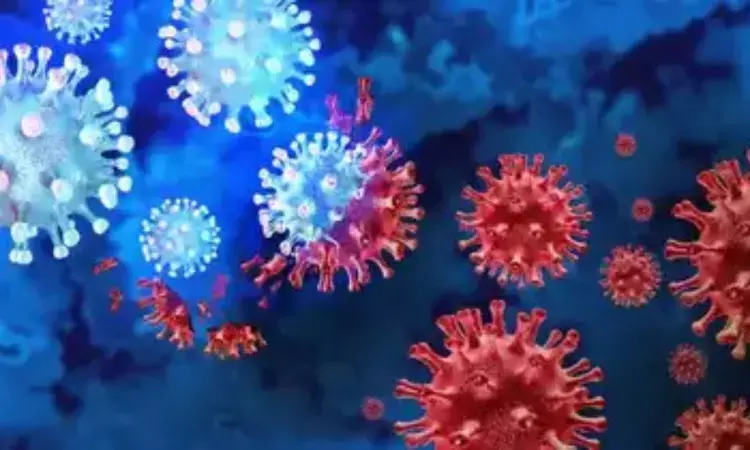- Home
- Medical news & Guidelines
- Anesthesiology
- Cardiology and CTVS
- Critical Care
- Dentistry
- Dermatology
- Diabetes and Endocrinology
- ENT
- Gastroenterology
- Medicine
- Nephrology
- Neurology
- Obstretics-Gynaecology
- Oncology
- Ophthalmology
- Orthopaedics
- Pediatrics-Neonatology
- Psychiatry
- Pulmonology
- Radiology
- Surgery
- Urology
- Laboratory Medicine
- Diet
- Nursing
- Paramedical
- Physiotherapy
- Health news
- Fact Check
- Bone Health Fact Check
- Brain Health Fact Check
- Cancer Related Fact Check
- Child Care Fact Check
- Dental and oral health fact check
- Diabetes and metabolic health fact check
- Diet and Nutrition Fact Check
- Eye and ENT Care Fact Check
- Fitness fact check
- Gut health fact check
- Heart health fact check
- Kidney health fact check
- Medical education fact check
- Men's health fact check
- Respiratory fact check
- Skin and hair care fact check
- Vaccine and Immunization fact check
- Women's health fact check
- AYUSH
- State News
- Andaman and Nicobar Islands
- Andhra Pradesh
- Arunachal Pradesh
- Assam
- Bihar
- Chandigarh
- Chattisgarh
- Dadra and Nagar Haveli
- Daman and Diu
- Delhi
- Goa
- Gujarat
- Haryana
- Himachal Pradesh
- Jammu & Kashmir
- Jharkhand
- Karnataka
- Kerala
- Ladakh
- Lakshadweep
- Madhya Pradesh
- Maharashtra
- Manipur
- Meghalaya
- Mizoram
- Nagaland
- Odisha
- Puducherry
- Punjab
- Rajasthan
- Sikkim
- Tamil Nadu
- Telangana
- Tripura
- Uttar Pradesh
- Uttrakhand
- West Bengal
- Medical Education
- Industry
WHO terms new COVID strain JN.1 as "variant of interest" with low low overall risk

USA: The global health agency, the World Health Organization (WHO) has termed the latest COVID-19 variant JN.1 a standalone "variant of interest" and said JN.1 will drive an increase in cases of the virus.However, the global health body emphasised that the overall risk posed by JN.1 remains low based on current evidence. India has so far confirmed 21 cases of the JN.1 Covid variant, sparking both attention and concern across the nation.
SARS-CoV-2 is the virus that causes COVID, and it evolves, like other viruses, sometimes changing how the virus affects people or how well-existing treatments and vaccines work against it.
Viruses are constantly evolving. These modifications are known as "mutations," and the resulting virus is known as a "variant." A "variant of interest" is a mutation that is believed to or known to create major differences from the original strain and is widely diffused in numerous regions or countries.
The JN.1 and Omicron versions are almost identical except for a single variation in their spike proteins, which allow the virus to penetrate human cells.
"All viruses, including SARS-CoV-2, the virus that causes COVID-19, change over time. Most changes have little to no impact on the virus’s properties," the WHO stated in its summary.
"However, some changes may affect the virus’s properties, such as how easily it spreads, the performance of vaccines, the associated disease severity, diagnostic tools, therapeutic medicines, or other public health and social measures."
According to the summary published by the agency, previously, the JN.1 was grouped with its relative BA.2.86 but has risen so much in the past four weeks that the WHO moved it to standalone status. Worldwide prevalence of JN.1 jumped from 3% for the week ending November 5 to 27% for the week ending December 3. During the same period, there was a rise in the cases of JN.1 from 1% to 66% in the Western Pacific, which stretches across 37 countries, from China and Mongolia to Australia and New Zealand.
In the US, there has been a rapid increase in JN.1. The variant accounted for an estimated 21% of cases for the two weeks ending December 9, up from 8% during the 2 weeks prior.
The CDC and the WHO have said the current COVID-19 vaccine appears to protect people against severe symptoms due to JN.1, and the WHO called the rising variant's public health risk "low."
Currently, there seems to be no significant evidence suggesting that the JN.1 variant is more severe or that it poses a substantial public health risk. It's more contagious, which could lead to more infections.
In its risk analysis, the WHO acknowledged that it's not certain whether JN.1 has a higher risk of evading immunity or causing more severe symptoms than other strains. The WHO advised countries to further study how much JN.1 can evade existing antibodies and whether the variant leads to more severe disease.
The latest CDC data suggests that 11% of COVID tests reported to the agency are positive, and 23,432 people were hospitalized with severe symptoms within seven days. Previously, the CDC had urgently asked people to get vaccinated against respiratory illnesses like COVID-19 and the flu ahead of the holidays seeing the rapid rise in the cases in the US.
The agency advised, "Getting vaccinated now can help prevent hospitalizations and save lives."
Dr Kamal Kant Kohli-MBBS, DTCD- a chest specialist with more than 30 years of practice and a flair for writing clinical articles, Dr Kamal Kant Kohli joined Medical Dialogues as a Chief Editor of Medical News. Besides writing articles, as an editor, he proofreads and verifies all the medical content published on Medical Dialogues including those coming from journals, studies,medical conferences,guidelines etc. Email: drkohli@medicaldialogues.in. Contact no. 011-43720751


